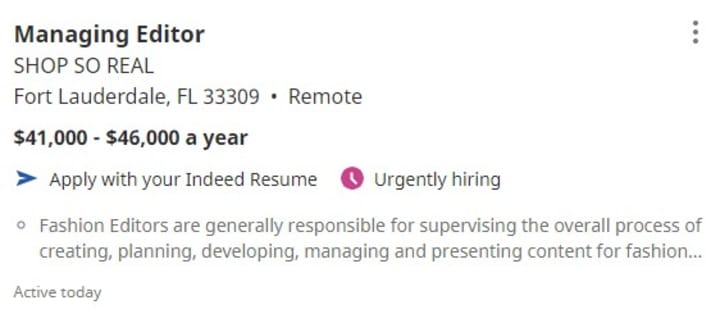
I'm going to be real and transparent with you because no one was ever transparent with me in college.
And it would have helped A LOT.
When I was choosing a career, I looked into magazine journalism. I loved reading magazines—especially advice articles—and I wanted to write them.
This was in high school.
However, no one told me that there's usually someone solely dedicated to writing the advice column. Plus, they probably do other things for the magazine. They might even have another article or 2 per week that they need to find sources for, interview, and write.
And you might not like what you're writing about.
No one told me that the journalism industry was cutthroat on deadlines, stressful, sometimes depressing with its pessimism, and didn't pay well.
I remember doing a search on the state of Wisconsin's Career website in high school. I searched "magazine," and magazine editor popped up. They said $60k was the median salary, and you'd have to move to either coast to get a job.
I asked my mom if that was a good salary.
"That's really good," she said. She was still with my dad, and she was raising two kids. She could barely hold a job, so, to her, that sounded like the jackpot. What I didn't know was that it would take years to pay off college debt with that salary. But, that's another story for a different day.
What I wanted to know back in college is what journalists made. Our professors wouldn't tell us. Really helpful.
I had to be in either Chicago, New York, or Los Angeles for the opportunity. No one ever told me about the cost of living in either of those places. And no one ever told me that I wouldn't find peace in the apartment that I paid so much for—I'd be living with roommates beyond college.

Ugh.
So, I'm here to compare salaries and let you know that if you're like me, with $150k in student loan debt from your magazine journalism degree from your private art school, you can switch career paths after you graduate. And nothing bad will happen. In fact, only good can come from it.
A magazine editor, according to my recent searches on Indeed.com, pull in around $20 per hour, or $41,600. The average, according to ZipRecruiter, is $51,842, or $25 per hour.
Oof. That dropped since I last looked 10 years ago.

Yeah. Let's do the math.
Your apartment in Los Angeles is $3k per month. You share it with 2 other people. Your rent is $1,000. Your take home pay is $2,800 after taxes. You're left with $1,800 for your $350 car payment and $350 student loan payment. After that, you have $1,100 left for bills, groceries, gas, entertainment, a gym membership, retirement, and furnishing your new apartment.
Yeeeah. About that.
Journalism pretty much hit the fan in 2014, when print newspapers and magazines started to die off and everything became completely digital. Which, ironically, is the year I graduated.
Cool.
So you know what I said? I said "I'll write anything." And a recruiter popped up in my inbox for a copywriter.
This is currently my bread and butter (or my bacon and olive oil, for all of my keto friends). I went from $14 per hour as an entry-level copywriter to getting considered for jobs up to $50 per hour as a senior-level copywriter over the course of 7 years. Copywriting has a future. Journalism has...well, a rollercoaster.

1. Copywriter
"What the hell is a copywriter, anyway?" —You
You know that text on the back of the shampoo bottle, those catchy slogans on billboards, and that text that entices you to take the leap on that online purchase? Yeah, that's all copywriters.
Essentially, we write ads.
The way I like to describe it? We are cheerleader writers. We are journalists turned 100% biased toward our company and product. We fill our words with rainbows instead of black-and-white facts. But we do incorporate facts in a very enticing and intelligent, sellable way.
Median salary: $54,463, according to CareerExplorer

2. PR Specialist
What the hell does PR stand for, anyway? —You
Public Relations. The opposite of magazine journalism is PR—but it can pay good money, especially in today's technology-driven world. By that, I mean "social-media-slip-up" world.
There are so many companies trying to make a great impression on customers, but there are a lot of assholes that need reigning in online and in the news. That's where you come in. Spin the truth and make a company look good after they've done something wrong.
You're essentially the overly-optimistic journalist at this point. You can convince with facts, but you need rose-tinted glasses to be able to write for companies like this. For that, you will be rewarded greatly.
Median salary: $61, 150, according to U.S. News

3. Content Creator
This is a path that is pretty vast. You can be a content creator if you're a YouTuber or social media influencer. But what I mean is that you're a content creator, as in "profesh blogger" for a company.
These don't earn as much of a salary as the previous two do—probably because there is a lot of competition, and there's already a lot of it out there. However, the demand for it has never been so strong. Forget magazines, and remember that every company needs a writer. And they'll probably need you for SEO (search engine optimization). If writing the same phrases over and over in your blog doesn't bother you, then go for it.
Median Salary: $38,739, according to Salary.com

4. Proofreader
This one is a little tricky because with the way that text, social media, and conversational typing is going, it may become obsolete. Heck, I know plenty of company head honchos that are too cool for capitalization and proper punctuation.
Median salary: $51,391, according to ZipRecruiter

5. Freelance as any of these
You don't have to pick a profession immediately. You can dabble like I did in copywriting, and discover that you really love it (or hate it) and want to make it your career (or not). That's the great thing about freelance. You can meet with recruiters and discuss your goals, and they'll find the right fit for you.
Or, you can take the reigns and cold-pitch (send out emails introducing yourself and your services), or you can go on a freelance marketplace like Upwork and offer your services to someone in current need.
Whatever you do, change your career path if you don't love an aspect of journalism
Whether it's the pay or the stress, there are plenty of reasons to jump ship as a journalist. You don't have to stay one forever. You have writing, interviewing, and researching skills that a lot of people don't have. You could even go into HR if you wanted! No matter your choices, you have plenty of them, and it's all thanks to your journalism skillset.
Did you find this article helpful? Did you hate it? Leave a heart or a tip, and tweet me either way at @LisaRSchulz. Let me know what you plan to do. Feel free to view my writing portfolio (admire the work that got me into big companies) at LisaSchulz.com.
About the Creator
Maddie M.
I'm a creative copywriter by day and a fiction/non-fiction writer by night.






Comments
There are no comments for this story
Be the first to respond and start the conversation.